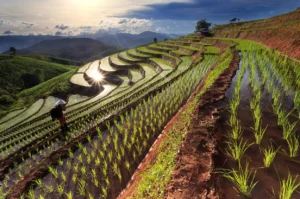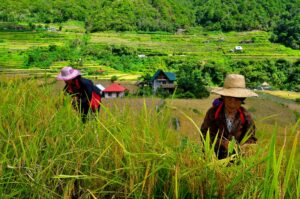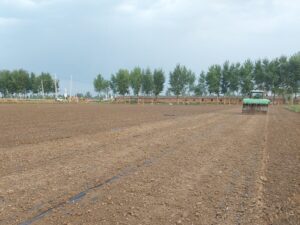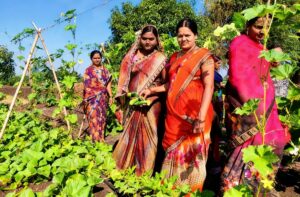For Glégnon Codjo, a smallholder ricefarmer in Benin, climate change is not a matter of debate. It is fast eroding his source of livelihood. “Our seasons have gone crazy: either the rains don’t come when our crops need them or there is so much rain that our crops rot,” he laments. “I thought God was angry with us. But now, I am told that all this is happening because of climate change.”
Like Glégnon, millions of smallholder farmers in Africa are increasingly grappling with the changing climate around them. Scientists predict that climate change will make extreme weather conditions—such as floods and droughts that can erode soil and lead to crop failure—more common.
When combined with the natural vulnerability and poor adaptive capacity in Africa, these impacts on agriculture could have devastating consequences for food security, poverty, and social welfare. Therefore, climate change is likely to have a far greater impact here than in other parts of the world.
Scientists, governments, and donors need to take urgent measures to improve the resilience of rural African communities to enable them to better adapt to climate change.
Rice is increasingly becoming important in Africa—both as a food and cash crop—and increased rice production will be crucial to achieving the necessary adaptation. Rice production in the region, however, is affected by such stresses as drought, salinity, and extreme temperatures, all of which are expected to worsen with climate change. To adapt successfully to climate change, farmers need rice technologies with greater tolerance of these stresses.
Since these stresses have always posed a significant threat to rice production, the Africa Rice Center (AfricaRice) has been developing for several years now rice varieties adapted to local stresses and more efficient farming techniques to help poor farmers better manage their use of the increasingly scarce water and fragile soil in Africa. Their efforts are now paying rich dividends.
The African cultivated rice species Oryza glaberrima is a rich reservoir of useful genes for resistance to major stresses. This discovery led AfricaRice scientists to cross the African rice species with the higher-yielding Asian O. sativa, which resulted in the birth of a generation of new rice varieties, called NERICA®. The NERICA varieties are promising for rainfed systems in Africa. Farmers like these varieties because they mature early and thus often escape drought.
Using both conventional breeding and biotechnology, AfricaRice scientists continue to develop rice varieties that are even hardier than NERICA by maximizing the diversity of the African rice germplasm pool consisting of O. glaberrima, its wild relatives (O. barthii and O. longistaminata), and O. sativa land races. These offer a massive potential for use as sources for resistances to major stresses in rice.
New scientific tools, such as molecular biology techniques, help speed up the development of new stress-tolerant rice varieties as they enable AfricaRice breeders and their partners to more efficiently identify and select genes that control stress tolerance. Because of this, the scientists can then successfully transfer the desirable traits from the African rice gene pool into popular varieties.
This work is closely allied with the farmer participatory approach, which is highly effective in ensuring that rice improvement also takes into account farmers’ valuable local knowledge. It is crucial for these new varieties to suit local needs and preferences.
“Thus, climate-resilient rice varieties resulting from this work have already reached farmers’ fields, and more are in the making,” said Dr. Baboucarr Manneh, AfricaRice coordinator for the IRRI-AfricaRice joint project on “Stress-tolerant rice for poor farmers in Africa and South Asia (STRASA).”
The STRASA project, which involves 14 African countries and three South Asian countries, is funded by the Bill & Melinda Gates Foundation through the International Rice Research Institute. It aims to accelerate the development and delivery of improved rice varieties tolerant of five major stresses—drought, submergence, salinity, iron toxicity, and low temperature.Thanks to this project, new stress-tolerant rice varieties are now being evaluated in farmers’ fields using the farmer participatory varietal selection approach.
However, integrated crop and soil fertility management strategies still need to be developed and disseminated to realize the full potential of climate-resilient varieties of rice and also to stabilize yields and reduce environmental degradation arising from climate change in rice ecosystems.
AfricaRice has developed an integrated crop management (ICM) approach for irrigated and rainfed lowlands. Significant gains in yields profits from ICM have been obtained across the continent.
[dropcap]A study by AfricaRice demonstrates that a paddy irrigation regime that starts with the traditional flooding practice and then changes to alternate wetting and drying later on can save water with little or no yield loss in a Sahelian environment, provided weeds are controlled.
AfricaRice is closely involved in a multipartnership project on “Developing rice and sorghum crop adaptation strategies for climate change in vulnerable environments in Africa” (RISOCAS), which is led by the University of Hohenheim. This endeavor is carried out in partnership with the Centre de coopération internationale en recherche agronomique pour le développement (CIRAD) for crop modeling. It aims to deliver coping strategies for crops to adapt to changing climatic conditions, along with tools and methods that will enable stakeholders to develop such strategies further, or to apply them to other crops or environments.
As part of a new project to be launched in 2010, AfricaRice will initiate a study on the relationship between rice diseases and climate change. Two of the major rice diseases affecting the region are rice blast and bacterial blight. Both are greatly influenced by climate, especially temperature and humidity. Funded by Gesellschaft für Technische Zusammenarbeit, the project will be carried out in Uganda, Rwanda, and Tanzania in collaboration with German universities and IRRI.
“We are also planning to get climatologists and geographic information systems (GIS) experts more involved in environmental characterization,” explained Dr. Paul Kiepe, the focal person in charge of climate change–related research at AfricaRice. “More precise predictions of future climate patterns are needed in this research that aims to develop climate-resilient, rice-based technologies.”
AfricaRice continues to find and improve technologies for resource-poor farmers in Africa that are suitable and effective in reducing the negative effects of climate change on rice production and marketing.
_____________________________________
Ms. Mohapatra serves as head of Marketing and Communications and Member of the Office of the Director General at Africa Rice Center.









